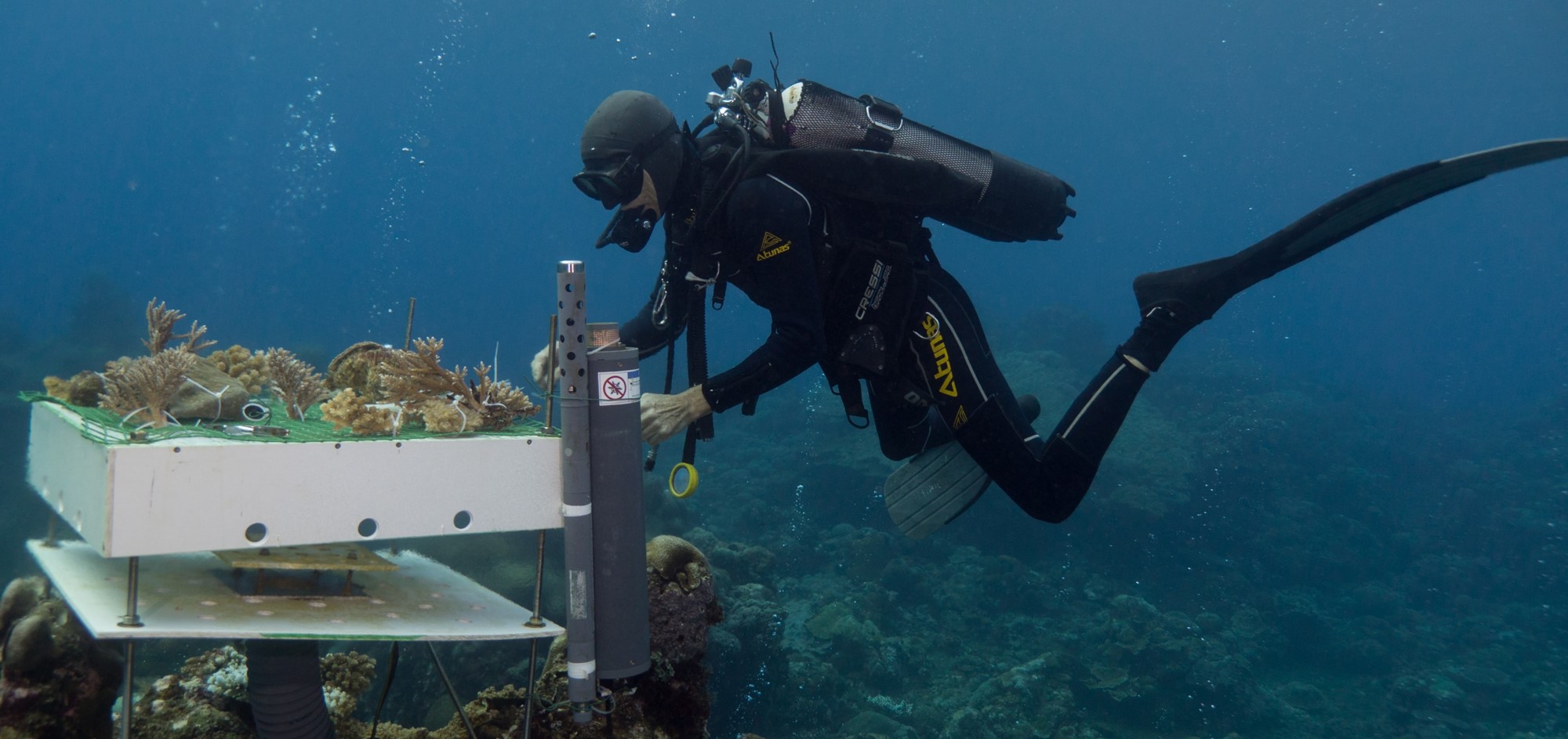Sylvie Fiat
Keywords :
informatique scientifique, valorisation, FAIR, data management, information system, open scienceScientific computing, research data management
I joined IRD in 2009 as an information systems and data management engineer (emploi type E2C45 - Ingénieur-e en ingénierie logicielle) at UMR ENTROPIE, a tropical marine ecology research team based in New Caledonia. Since 2015, I coordinate the transverse research support team hat includes engineers and technicians of the UMR.
Gestion des données et observatoires
Since my arrival at the IRD, I have been working on tools for the management and valorization of research data, particularly in the field of marine ecology, including the full implementation of the information system Lagplon of which I am now the project leader. Created by the ORSTOM diving service in Noumea, Lagplon is a database of the marine biodiversity of the reefs and lagoons of New Caledonia and other regions of the Indo-Pacific. The collection and observation data are derived from inventories of the benthic fauna and flora of coastal waters. Lagplon contributes to the updating of taxonomic reference systems in the French overseas territories and feeds, within the framework of the IFRECOR initiative and the National Strategy for Biodiversity, the national (INPN and PNDB) and international (GBIF) portals.
Since 2011, I am responsible for the information system of the observatory ReefTEMPS, for which I entirely designed and implemented the software architecture, in collaboration with the project team. ReefTEMPS is a network of physico-chemical sensors on the coastal domain of about twenty territories and island states in the South Pacific, for the long-term monitoring of climate change and its effects on the state of coral reefs and their resources. The ReefTEMPS observatory has been integrated into the Research Infrastructure « Infrastructure de recherche littorale et côtière » ILICO and since 2020 is labellised Service National d’Observation (SNO), with a special mention for it Information system and its valorization of the data based on a FAIR architecture (Findable, Accessible, Interoperable, Reusable) thus meeting the criteria defined in the national plan for Open Science of the MESRI.
OPEN SCIENCE
I work on the implementation of FAIR principles, on the implementation of data reusability with the definition of Data Management Plan (DMP) and more generally on the field of Open Science that I implement in the research projects of the UMR. Within this scope, I am responsible for the "databases" workpackage of ANR SEAMOUNTS which studies the fish biodiversity associated with New Caledonian seamounts. This ANR integrates data from underwater videos, population genetics and environmental DNA for analysis with artificial intelligence algorithms.
I am also the "data" referent for the UMR Entropie at DataSuds, the data warehouse carried by the IRD. In this context, I accompany the researchers of the UMR in the description and publication of their datasets.
TRANSVERSAL ACTIVITIES AND SUPERVISION
I am the main coordinator of the transverse research support team (ETAR) (ETAR) of the UMR ENTROPIE since 2015, in collaboration with two other coordinators, one in Reunion Island, the second based at the Saint Vincent marine aquaculture station in New Caledonia. The team is composed of a part of the Engineers and Technicians of the UMR, about twenty people, gathering skills in aquaculture, biological expertise, training, computer science, Quality Health and Safety, laboratory and field, which are useful to all research axes. Its vocation is to provide support to the research by technical and/or scientific expertise on the projects of the Unit. The transversal team intervenes in all stages of the life cycle of research data and contributes strongly to the traceability of results and the reproducibility of research.
The New Caledonia computing cluster, shared between the University of New Caledonia and the IRD, and which received funding in 2020 to strengthen its high-performance computing capabilities and integrate artificial intelligence capabilities, has been part of the ETAR scope since 2020. I joined the cluster's think tank to help set up shared administration tools between UNC and IRD, propose automated backup solutions and integrate server monitoring within the scope of the regional service for innovative digital uses (SRUNI) in Noumea.
SUPPORT FOR THE SOUTH AND TRAINING
I work since 2015 with the Vanuatu Fisheries Department (VFD) and the University of South Pacific (USP) of Fidji as part of a participatory risk monitoring project for acanthasters « OREANET » which covers three countries including New Caledonia. Since 2018, I work with the Seychelles Fisheries Authorities (SFA) on the implementation of monitoring tools for sea cucumber fisheries in the framework of the European project SEACUSEY. I designed the participatory monitoring tools on the basis of open source software (based on Open Data Kit) so that they can be maintained directly by the administrations of the partner countries, however I am always available in support in case of problem or punctual need.
The International Mixed Laboratory MIKAROKA, co-sponsorised witj the Institut Halieutique et des Sciences marines (IH.SM) and the Centre National de Recherche Océanographique (CNRO) of Madagascar and with the IRD through the UMR ENTROPIE, aims at setting up a functional and sustainable observation platform of the coastal marine biodiversity and its uses in Madagascar. Since its creation in 2020, I am involved in the LMI as co-leader of the Transverse Component. am more specifically in charge of the IT support pole for the management of the LMI databases while respecting the implementation of the Open Science principles and FAIR Data Management.
In the framework of MIKAROKA, I obtained in 2020 a funding for a Structuring Training Project (PSF) « DONNEES », co-sponsored with the CNRO, qwhich consists in the implementation of a training workshop on open science in Nosy Bé, Madagascar. . The two-year project plans to bring together marine biodiversity researchers and students from Madagascar and the LMI to introduce and train them in open science. This workshop will have the opportunity to propose interventions from GBIF Madagascar and France, the head of the Nagoya focal point in Madagascar, members of the IRD Mission for Open Science as well as several engineers and researchers specialized in the field.
FIELD WORK
Finally, I have a certificate of aptitude for hyperbaric conditions, CAH Class 1B, and I accompany researchers in the field, especially for data collection, which allows me to be as close as possible to the business needs for their management.





